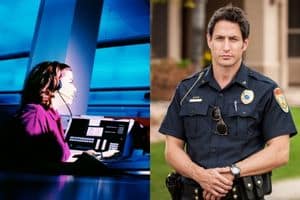911 is probably the most famous number in the country. When there is an emergency, you call this number and the operator on the other line will help connect you to people who will help. However, you may be wondering if the operator is technically a police officer or law enforcement because of their work in emergency response.

In most cases, 911 operators are not police officers nor are they law enforcement. They are workers who are hired to answer calls and then send the appropriate services based on the emergency at hand.
But even though they are not law enforcement, this does not mean that 911 operators are not qualified to handle your emergency. Keep reading to learn more about what 911 operators do and why they are not considered law enforcement.
Table of Contents
Do 911 Operators Work for Law Enforcement?
Hopefully you have never had to call 911, but if you have done so or seen it on television, you know that the call is answered by a person who asks about the nature of the emergency.
This person is real, rather than an automated response, and their job is an incredibly important one. 911 operators are often hired by the county police federation or emergency response association.
However, because they do not directly enforce laws or work with the justice system, they are not considered law enforcement or police officers.
What do 911 Operators Do?
Even though they are not law enforcement officers, 911 operators have to be highly skilled. Their job has many demands that they must respond to well, as lives are often on the line.
The following are the most common responsibilities for 911 operators:
- Determining the nature of the emergency: Operators have to ask callers what their emergency is, and from this decide what emergency department to send. Though this may seem straightforward, sometimes callers are hysterical or difficult to communicate with, so strong communication skills are a must.
- Finding the location: An operator will often ask for an address or location. Although calls can sometimes be tracked, this is a very tricky part of the job as sometimes people can be hard to find. The operator must have a thorough knowledge of locations throughout their area. If you’re interested, I wrote an entire article on if 911 knows your location, and how they do it.
- Helping people stay calm: Nobody wants to be in an emergency situation, and oftentimes the 911 operator is the first voice of reason that people hear. For this reason, an essential part of their job is to help callers stay calm even in difficult circumstances.
- Providing advice: Although they are not law enforcement or a doctor, 911 operators must still provide advice in situations. For instance, if someone witnesses a car crash, the operator might advise them not to move the injured people or approach the crash.
As you can see, 911 operators have a lot of responsibilities, and their job is definitely a crucial one. But, though they work as an extension of law enforcement, they are not actually enforcing any laws and so their work takes place more in the emergency services sector.
Have you ever heard someone say that 911 operators are rude? Check out this article I wrote about why 911 operators may be rude to callers!
Do 911 Operators Have to Have Training in Law Enforcement?
Although 911 operators work closely with law enforcement, they do not have to go through training specific to law enforcement officers (peace officer training). In fact, they are not even required to have a degree specific to law enforcement.
However they do often have to go through rigorous training to prepare them for the demands of their job.
The training requirements for law enforcement officers will be different for everyone depending on their location and agency. It is typical though for them to have the following things:
- Crisis Response Training
- Telecommunications Experience
- First Aid or CPR Certifications
- FEMA Incident Management Courses
- Civil Service Examinations
Beyond this, most employers will require 911 operators to undergo an extensive training before they begin working. This training is usually 400-520 hours and will familiarize new hires with the systems that they are using, as well as how to respond to a variety of crises.
Being a 911 responder is an important job, and while they do not have to have specific qualifications, they must have training that prepares them for the job at hand.
People often associate 911 responders with the police and law enforcement, but these responders are not technically part of law enforcement. Instead, they connect those having emergencies with the specific services they need. To meet this requirement, they must have important skills and undergo training that makes them very qualified for their work.